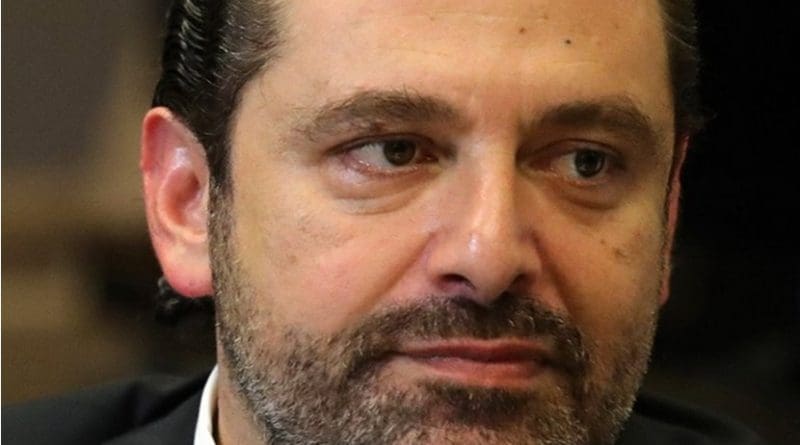Why Did Lebanon’s PM Saad Hariri Resign Now? – OpEd
Lebanon’s Prime Minister Saad Hariri has announced his resignation, amid the growing political dysfunction and nationwide protests.
Hariri’s announcement came after the past 13 days hundreds of youth overran protest sites in downtown Beirut, ransacking tents and stalls set up by demonstrators who, the protesters have demanded an overhaul of the ruling class and an end to rampant corruption.
Hariri’s resignation due to the protests has left politicians scrambling unsuccessfully to react and has exposed the depth of feeling in Lebanon, where an imminent economic collapse threatens to cripple the country’s banking system and social fabric.
In addition, the depth of the crisis and lack of political solutions have galvanized Lebanese citizens from all political persuasions and walks of life, leading to a movement that shows little sign of slowing down the aims of the citizens to protect the county but they didn’t know future consequences from Hezbollah and Amal, they want to get a part in political government on the other hand they do not support the change in government.
The other side, Hassan Nasrallah, the Hezbollah leader, the most powerful figure in Lebanon despite not holding an official position, has warned of chaos if protests could continue.
Hariri’s fearing even deeper instability in Lebanon, where political uncertainty and extreme levels of government debt have caused widespread alarm and spilled over into mass demonstrations, the scale of which had not been seen for more than a decade.
Beirut have become a forum for debate and defiant demands for change. Emboldened by the cross-sectarian movement and sensing there is more to lose by staying home, protesters have been unusually strident in their criticism of leaders, including Hariri and Nasrallah and dynasties that have run the country since the end of the civil war.
the protests in Lebanon started when the government announced to tax voice calls made through the Facebook-owned WhatsApp messaging software as people vented their anger at the political elite in the second nationwide protests.
Thereafter, the demonstrators and police clashed in Lebanon as thousands of people rallied against the government’s handling of an economic crisis.
On the other side, the security forces fired teargas and chased down protesters in Beirut on Friday after tens of thousands of people across Lebanon marched to demand the demise of a political elite, they accuse of looting the economy to the point of collapse. Lebanon’s internal security forces said 60 police were wounded.
Riot police in vehicles and on foot rounded up protesters, they fired rubber bullets and teargas canisters, dispersing demonstrators in Beirut’s commercial district. Dozens of people were wounded and detained. Rola Mohamed one of the demonstrators
Prime Minister Saad Hariri gave the government a 72-hour deadline to stop blocking him, hinting he may otherwise resign. on the other hand he blamed his partners in government for obstructing reforms that could ward off economic crisis.
In addition, Hariri said Lebanon was going through an “unprecedented, difficult time”.
We have to remember the Middle East protests in the 2011 Arab revolts which toppled four presidents.
At the same time after that speech Lebanese people from all sects and walks of life have come out on to the streets to wave banners and chant slogans urging Hariri’s government to go.
The rallies follow warnings by economists and investors that Lebanon’s economy and corruption-riddled financial system were closer to the brink than at any time since the wartorn 1980s.
The conflict started with high debt, stagnant growth, crumbling infrastructure and reduced capital inflows. The Lebanese pound, pegged against the dollar for two decades, has been under pressure.
The government unveiled a new revenue-raising measure earlier on Thursday, agreeing a charge of 20 cents a day for calls via voice-over-internet protocol (VoIP), used by applications including WhatsApp, Facebook (FB.O) calls and FaceTime.
On the other hand, al-Hariri’s government of national unity is seeking to approve a 2020 budget, a step that may help it unlock billions pledged by international donors.
The crisis escalated with closing schools also the public administration employees declared a strike so that workers could join protests expected. The Information Minister Jamal said, we will discuss a proposal to raise value-added tax by 2 percentage points in 2021 and a further 2 percentage points in 2022, until it reached 15%. But at that time, Telecoms Minister Mohamed Choucair told journalists the proposed levy on WhatsApp calls had been revoked.
Protesters started from Beirut then poured through villages . No political leader, Muslim or Christian, was spared their wrath. They called for leaders including Hariri, president Michel Aoun and parliament speaker, Nabih Berri, to step down.
The protesters waving Lebanese flags marched through the streets as patriotic music blared from loudspeakers. They shouted: “Our demands are one, our objective is one: the people want the downfall of the regime.” it’s the same as revolution in Egypt, Tunisia, Libya, Syria and Yemen.
Lebanon’s internal security apparatus said 52 police were injured on Friday and 70 people were arrested. Some protesters, including men in black hoods, blocked roads, set tyres on fire and used iron bars to smash storefronts in Beirut’s affluent downtown district.
Some streets in the capital looked like a battlefield, strewn with rubber bullets, smashed cars, broken glass and torn billboards. Firefighters struggled late into the night to douse fires.
Saudi Arabia, Kuwait and the United Arab Emirates warned their citizens against travelling to Lebanon. Bahrain told its nationals to leave at once.
In the end, the Hariri government resigned, but the state declared bankruptcy financially, will Lebanon’s fate to be like other Arab countries after the revolution? Lebanese should ask why did Hariri resign now, at the request of the state or are there orders from foreign countries to step down?
*Miral AlAshry, Associate Professor at Future University (FUE), Political Mass Media Department

